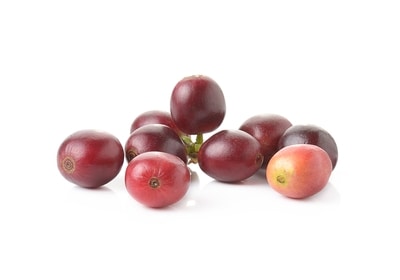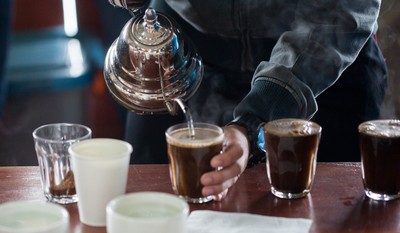What Is the Price of Kopi Luwak? (Full Breakdown for 2021-22)
The debate as to whether kopi luwak is the most expensive coffee still rages on, but what is the current price of kopi luwak?

Kopi luwak is one of the most expensive coffees in the world, with retail prices reaching $100 per kilogram ($45 per pound) for farmed and $1300 per kilogram ($600 per pound) for wild-collected beans. The price of a single cup of kopi luwak coffee is as low as $4 for the farmed variety and up to $100 for the wild variety.
So why such huge differences in price? Let’s take a detailed look at what determines kopi luwak’s price.
The price of kopi luwak

Kopi luwak is renowned as one of the most expensive coffees in the world, if not the most expensive.
The dispute as to whether or not it is the most expensive is due to some coffee companies setting artificially high prices in order to claim the coveted top spot of the world’s most expensive coffee.
But whether or not kopi luwak is, in fact, the most expensive, there’s no doubt that it’s ludicrously expensive.
Prices for kopi luwak per cup or per kilo vary considerably depending on its origins
There is an enormous difference in price between farmed kopi luwak and wild kopi luwak. As well as being superior in flavour, wild kopi luwak is so much more expensive to produce due to the increase in labour.
The price of a cup of farmed kopi luwak in kopi luwak-producing countries can be as little as $4. One such example is in Bali, a popular destination for those that want to try out this mysterious drink.
Outside the countries of origin, the prices rise dramatically. The prices for wild kopi luwak range anywhere from $35 – $100 per cup.[1]
For those that want to buy kopi luwak by the bag, the price of wild kopi luwak is over 13 times more expensive than the farmed variety.
In Indonesia, low-grade farmed kopi luwak can be bought at supermarkets as cheaply as $45 per pound ($100 per kilo).[2]
But when it comes to the wild variety, the sky’s the limit. One large online supplier of kopi luwak is currently selling a kilo (2.2lbs) for $659. But even that may not be the most expensive.
On the forum of a very well-known site, someone reportedly claims to have found kopi luwak advertised online at prices ranging from $680 – $1300 per pound ($1490 – $2800 per kilo).
But at prices like this, you have to think that the company selling the kopi luwak is probably just chancing their arm. The allure of paying so much for a bag of coffee is something to boast about at the dinner parties of the rich and famous.
Low production but high demand

When it comes to annual production, you’ll find different figures for kopi luwak all over the Internet.
One source claims that as much as 1100lbs (500kg) of wild kopi luwak is produced annually, and an estimated 50 tons (45 tonnes) of farmed kopi luwak.[3]
Still another source claims that under 500lbs (227kg) of genuine kopi luwak is produced each year.[4 pdf]
The problem is that there’s so much fake kopi luwak on the market that it’s difficult to know for sure just how much is produced.
But whatever the true figures are, the fact is that supply cannot keep up with demand, which leads to radically high prices.
And thanks to films such as The Bucket List, which stars Jack Nicholson and his love for kopi luwak, the hype behind this rare coffee is only increasing.
How sourcing affects price
Wild kopi luwak

Wild-sourced kopi luwak demands a vastly more expensive price tag due to the huge amounts of efforts involved in its production.
To make kopi luwak, you need Asian Palm civets. They roam freely in the wild in southern Asia, consuming coffee cherries as part of their varied omnivorous diet.
The coffee cherries pass through the digestive tract of the civets, but the coffee beans inside remain intact as they’re not digestible to the civet. Around a day or so after consuming the cherries, they are excreted by the civet.
Workers have to go foraging for the faeces of these wild civets. As you can imagine, this is tedious and tiring work in the hot sun of these Asian countries.
But the efforts involved in sourcing wild civet faeces is rewarded by the fact that it produces a superior cup of coffee.
This is because civets in the wild only select the ripest, reddest and sweetest tasting coffee cherries. The ripe fruit of the coffee cherry has an enormous impact on the coffee beans contained inside.
The higher sugar levels present in the ripe fruit imparts a delicious sweetness to the beans. Just think of the times you’ve bitten into a piece of fruit that hasn’t had chance to ripen fully. The sourness is extremely unpleasant, and the fruit is a shadow of what it would have become once ripened.
The extra labour combined with the superior taste are the reasons why wild kopi luwak demands such a high price compared to the farmed variety.
Farmed kopi luwak

Due to the profitability and high demand for kopi luwak, most of the world’s supply is now farmed, which is very sad.
Farmed civets live in horrendous conditions. They are confined to small cages with other civets, leaving them no space to move around.
The coffee cherries that farmers force-feed to civets often aren’t the ripest and tastiest ones the animals would naturally select in the wild, which greatly impacts the quality of the beans.
Production of farmed kopi luwak is a lot easier than with its wild equivalent as the workers do not have to go searching for the animals’ droppings.
However, there is still quite a bit of work involved to process the beans contained within the faeces for preparation of the roasting stage.
The poor conditions in which farmers keep the animals, along with the low-quality coffee cherries, result in a vastly inferior cup of kopi luwak coffee.
Is kopi luwak worth the high price?

Proponents sell kopi luwak on the premise that its unique taste stems from the enzymatic process the beans undergo inside the civet’s digestive tract. They claim the coffee contains less bitterness and acidity, contributing to a smooth flavor and complex aroma.
Whilst this no doubt would appeal to those whose misconception is that all coffee is inherently bitter, coffee aficionados within the industry say otherwise.
There have been various assessments made of kopi luwak in recent years, and the results are quite damning. The Specialty Coffee Association of America (SCAA) drew the conclusion that kopi luwak simply tastes bad.
Other critics could only muster the backhanded compliment of saying that there was nothing to make kopi luwak superior to any other type of coffee.
SCAA and other critics did admit that the lower levels of bitterness and acidity, as well as kopi luwak’s smooth body, would be characteristics that appeal to some coffee drinkers.
In truth, people don’t buy kopi luwak for its exceptional taste
They do so because of the mystery that surrounds one of the rarest and most expensive beverages on the planet.
There’s no getting away from the fact that wild-sourced kopi luwak is superior to the farmed variety. But at around $600 per kilo, there are so many other great coffees on the market that truly are delicious and worth seeking out.
And although the heavily reduced price of farmed kopi luwak is a reflection of its quality, the exorbitant price of $100 per kilo is nothing but a scam.
Even if you’re in a financial situation that allows you to buy yourself a bag of kopi luwak, the fact that it’s so unethical is reason alone to boycott it altogether.
Due to the terrible living conditions that civets have to endure, as well as their poor diet, means they often become sick both mentally and physically, with many even dying as a result.
And don’t go fooling yourself into thinking that you can buy the wild variety without a conscience. Estimates state that around 80 percent of the wild kopi luwak market is fake, so chances are you’ll end up with the farmed variety.
A very expensive coffee that’s worth its price

For a truly special coffee with no bitterness due to excellent processing, look for online coffee roasters selling Hacienda La Esmeralda geisha coffee from Panama.
World-renowned specialty coffee roasters La Cabra of Denmark had this extraordinary coffee on sale only recently.
A 100g box of expertly roasted coffee beans was the offering at the remarkable price of only £26.50 ($34.60). I think £265 per kilo is enough to give you boasting rights, don’t you?
La Cabra ships all over the world, and if you visit their website, you can add your email to be notified the next time that this wonderful coffee is available.
If you can’t stretch to paying £265 a kilo, try some exceptional coffees from the Best UK Specialty Coffee Roasters, which start from just £5 a bag. Every coffee roaster on the list has international shipping.







